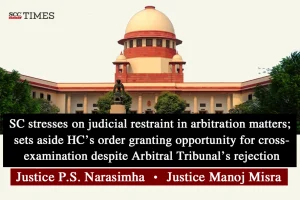Supreme Court: In a set of two civil appeals, the Division Bench of PS Narasimha and Manoj Misra, JJ., while considering that whether the High Court correctly exercised its supervisory jurisdiction under Article 227 in granting the respondent one more opportunity to cross- examine the appellant’s witness, despite the Arbitral Tribunal rejecting such a prayer, held that the High Court’s decision was not justified as the High Court had not bothered to indicate under what circumstances the order passed by the Tribunal was perverse. The Court directed the Arbitral Tribunal to resume the proceedings and conclude the same as expeditiously as possible.
Factual Matrix
The appellant, a startup company providing educational software and related services, and the respondent/claimant, a provider of capital advisory services to various companies, entered into a client service agreement. Under this agreement, the respondent was to provide advisory services to the appellant. Disputes arose between the parties with respect to non-payment of fee for the services rendered by respondent, prompting the respondent to invoke arbitration.
Following the constitution of the Arbitral Tribunal, proceedings commenced from 06-09- 2023. The Tribunal formulated the specific issues for consideration that needed to be addressed, by the parties to proceedings. The respondent produced two witnesses CW-1 and CW-2 and their cross examination was concluded. When the cross-examination of appellant’s witness RW-1 commenced, though it commenced at 11 am and continued till 07:00 p.m., respondent’s counsel sought permission to defer the cross-examination of RW-1 to some other day and sought an additional hour for completing the cross-examination of RW-1. The Tribunal acceded to respondent’s request for additional one hour of cross-examination.
The proceedings kept on being delayed and the parties consensually extended the mandate of the Tribunal by 6 months which was due to expire on 16-05-2024 as per Section 29-A of the Arbitration and Conciliation Act, 1996. Ultimately, the proceedings resumed with cross- examination of RW-1 on 01-10-2024. The Tribunal in the record of proceedings noted that the cross-examination of RW-1 was concluded and accordingly, the witness was discharged.
After two days, i.e. on 03-10-2024, respondent moved an Interlocutory Application before the Tribunal seeking extension of time for cross-examination of RW-1. The Tribunal noted that the arbitral proceedings were time bound and in fact the extended mandate was also to expire soon, hence, the respondent’s application was rejected stating that the respondent’s approach reflected lack of preparedness and a non-serious attitude.
The respondent challenged the said order of the Arbitral Tribunal by filing a petition under Article 227 of the Constitution and sought a direction to the Tribunal for providing further opportunity to cross-examine RW-1. The High Court noted that judicial interference in such type of matter was least warranted but concluded that in view of the exceptional circumstances there can be a direction to the Tribunal to grant further opportunity to the respondent to cross-examine RW-1 on the date and time fixed by the Tribunal.
Analysis and Decision
The Court said that the first principle that governs ‘conduct of arbitral proceedings’ under Chapter V of the Act is the obligation of equal treatment of parties. The Court noted that under Section 18 of the Act, it is the statutory duty of the Arbitral Tribunal to ensure that the parties are treated with equality and each party is given full opportunity to present its case. The Court said that at the same time, there is yet another statutory obligation, imposed on the judicial authorities for statutory incorporation of judicial restraint in interfering with matters governed under Part I of the Act relating to arbitration agreement, composition and jurisdiction of Arbitral Tribunal, coupled with the conduct of the proceedings and making, challenge and enforcement of the award.
In the matter at hand, the Corut said that the Arbitral Tribunal gave full opportunity to all parties. The Court also said that the unrestrained cross-examination of RW-1 by the respondent already exceeded 12 hours, but the respondent was not satisfied with it. Hence, the Court said that the High Court should have restrained itself from interfering. The Court also said that interference under Article 226/227 is ‘permissible only if the order is completely perverse i.e. that the perversity must stare in the face.’
Regarding the question if the High Court found any perversity in the Tribunal’s order, the Court said that the High Court found no perversity in the decision of the Tribunal. The Court added that the High Court had not bothered to indicate under what circumstances the order passed by the Tribunal was perverse, all that the High Court said was that cross-examination is one of the most valuable and effective means of discovering the truth. The Court said that the said statement is a normative statement, and nobody disputed the said principle. The Court clarified that the only enquiry required was whether there was a denial of opportunity for an effective cross-examination of the witness, and that there is no discretion about this aspect of the matter, except to say that in the facts and circumstances of the case and as an exceptional circumstance as well, the request of the respondent was excessive.
Conclusively, the Court found no justification in the order passed by the High Court in interfering with the directions of the Arbitral Tribunal holding that full and sufficient opportunity to cross-examine RW-1 was already given, and no further extension of time was warranted. Therefore, the Court allowed the appeals and set aside the orders passed by the High Court.
CASE DETAILS
|
Citation: Appellants : Respondents : |
Advocates who appeared in this case For Petitioner(s): For Respondent(s): |
CORAM :

